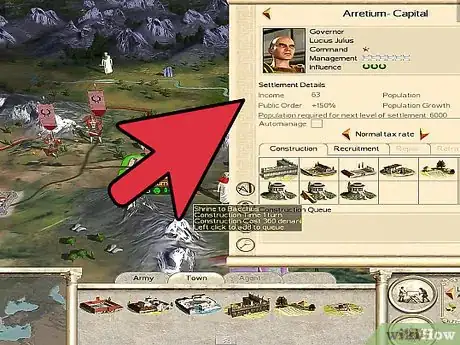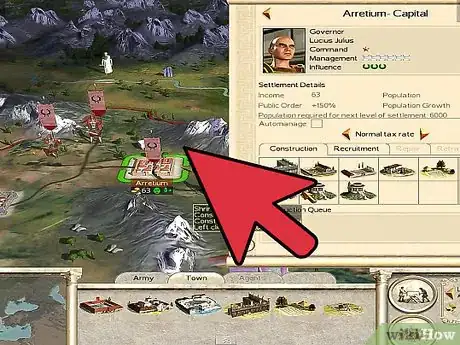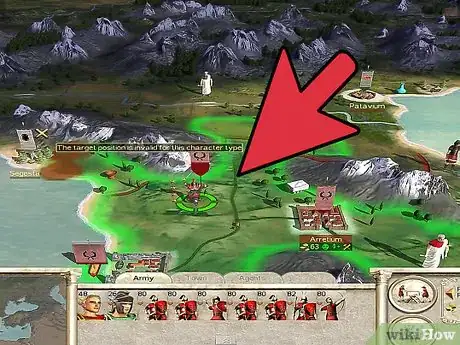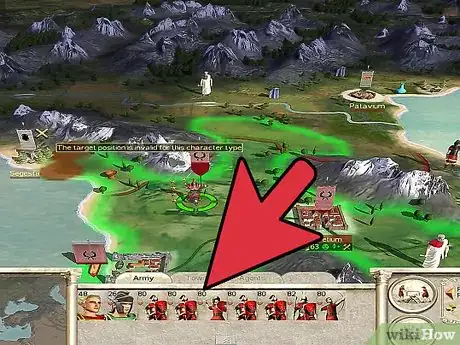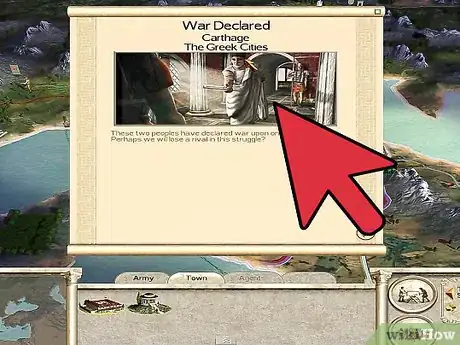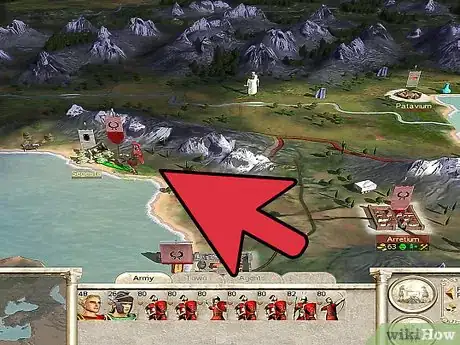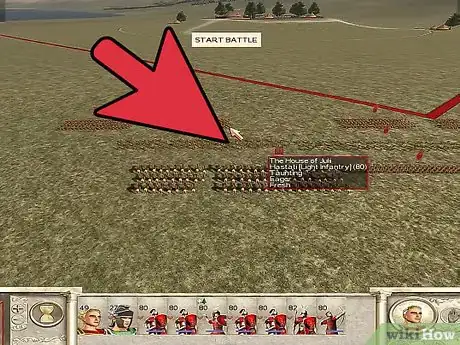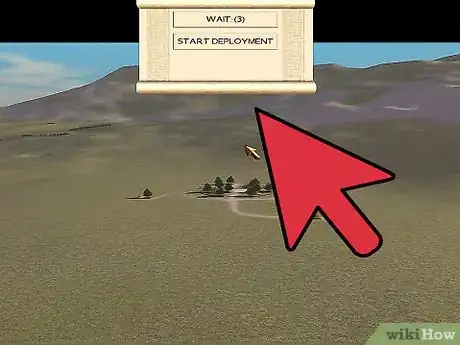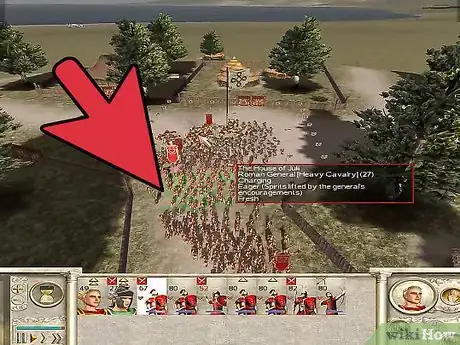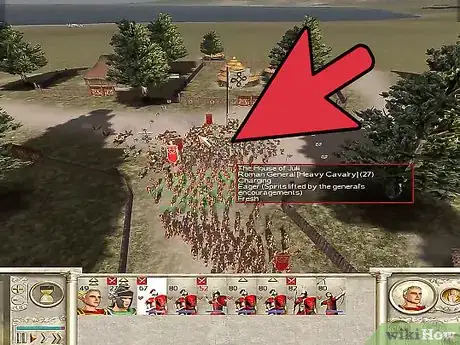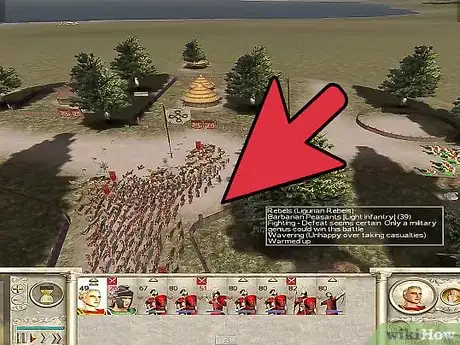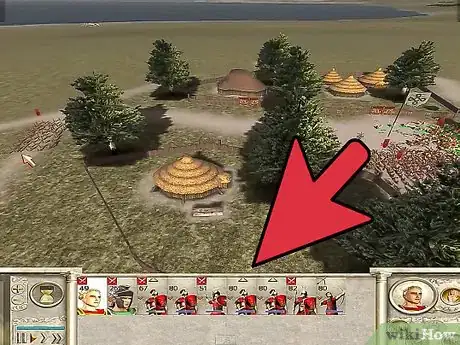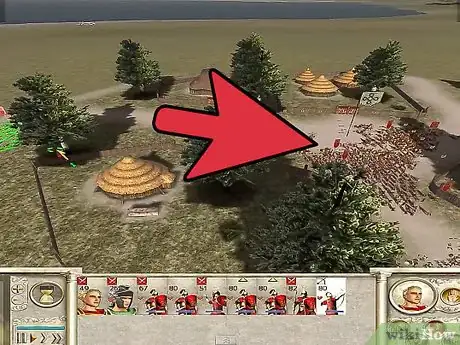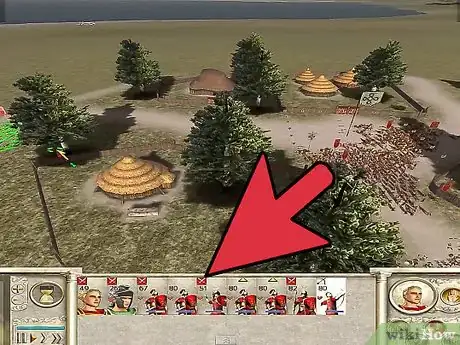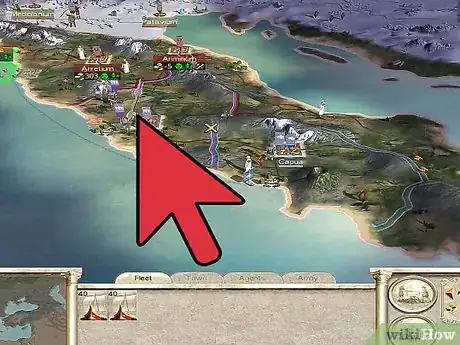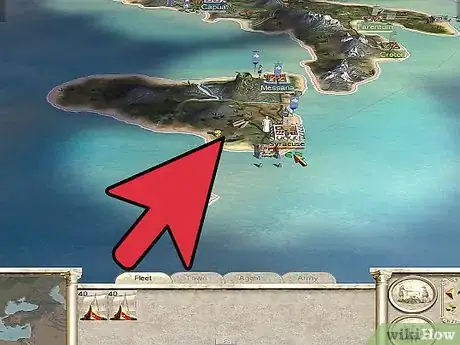X
wikiHow is a “wiki,” similar to Wikipedia, which means that many of our articles are co-written by multiple authors. To create this article, 27 people, some anonymous, worked to edit and improve it over time.
This article has been viewed 366,589 times.
Learn more...
Enjoy playing Rome but overwhelmed by all the different aspects to manage? Follow this guide and you'll make Caesar look like a Gallic catamite!
Steps
Part 2
Part 2 of 7:
Building structures
-
1Build. As long as you have the money, try to make sure that all of your settlements have at least one building being produced on the construction panel.
-
2Start building by creating whichever religious structure you want. If you have conquered a city and it already has a religious structure from a different culture, destroy it and build your own. The only exception to this is when that city's happiness rating is too low to last a turn without that building without revolting.
-
3Build your structures in order of how many turns it will take to complete, from smallest to largest. However, if you have the ability to upgrade the city and the citizens are becoming too restless, delay whichever current structure you are building with the new one that will advance your city.
Advertisement
Part 5
Part 5 of 7:
Besieging
-
1Remember that while besieging an enemy town, make your weakest troops command the siege engines you build at the town (siege towers, rams, etc.) unless they are at risk from being attacked by the outside. You don't want your best unit to be cut down by arrows before even engaging the enemy. When you've brought siege equipment, such as onagers and ballistate, try not to destroy any buildings that appear in the campaign map. When you've finally broken the gate or a section of their wall, you should group the units you plan to send in and press Shift+8 to move them into column formation. This is best for storming a city.
-
2After conquering a city, see what the city's happiness level is before you decide what to do with its citizens by looking at its window through the space between the information scroll and the edge of the screen. If it's red, you should massacre or enslave the citizens. In that situation, massacre them. If it's blue, enslave them. If it's yellow, you could still enslave them just in case. If it's green, neither massacre nor enslavement is necessary, but then again, you are the king, so it's completely up to you.
Advertisement
Part 6
Part 6 of 7:
Responding when under siege
-
1When one of your cities is under siege, command the battle yourself, no matter what the odds. It is possible to defend a city with 21 weak Greek Cavaliers against 350 Macedonian spearmen and archers and win with 15 men remaining and your general still alive. When you're the one whose city is about to be stormed, place the troops with the strongest defence near the place where the enemy has penetrated your city, and put them into guard mode. There are all types of different methods you can attempt to try to save your city. Something that often works is to put some spearmen a few yards back from wherever the enemy has come in and let them advance. Then, order any swordsmen, no matter how strong or weak, to attack it's now unprotected flanks since it is trapped between your defending army and the gate.
-
2Battles are often won before the opposing armies ever see each other. Always try to place your army on a hilltop when it's about to be attacked. This hill will be on the battle map as well, and the slope could be the difference between defeat and victory.
-
3Control where your ranged units are firing. Leaving your ranged units on fire-at-will can cause them to fire and hit your own men if they are close to the enemy.
-
4Manipulate your enemy with decoys and bait. Put yourself into win-win situations.
-
5Take care when around chariots. Chariots on the run can still cause casualties to you by the blades on their wheels.
-
6Use morale. Morale is as much a weapon as any conventional one, don't overlook it.
Advertisement
Part 7
Part 7 of 7:
Expansion
-
1When choosing where to expand, always keep in mind two factors. The first is military, take over a settlement to make defending your empire easier, or to weaken an enemy. The second, and most important, is economics. Your main drive in attacking a settlement is to make more money, either by opening up new trade routes or merely adding more people to tax.
-
2Use forts, they can be priceless in their ability to keep enemies out of your territory, to seal mountain passes and shut down bridges. Only family members (Generals with portraits) can build forts. These forts must be manned by at least one unit at all times, or they will fall into disrepair, and disappear. Forts can be used to prevent war, and they also makes sure you'll be calling the shots once it starts.
Advertisement
Warnings
- Attack the city of Carthage,Patavium, or Thapsus without a strong economy may have you spending thousands of denarii trying to keep the people happy. On the contrary, taking over Carthage early in the campaign can give you a lot of advantages. The city of Carthage is usually more advanced than the other settlements you start with. This gives you the advantage of being able to train more advanced units. It may be your first settlement to make it to "Huge" status. Also, Carthage can be a huge money maker. It's also a relatively safe place to raise up armies which you can export to Rome, Greece, and other places.⧼thumbs_response⧽
Advertisement
About This Article
Advertisement
